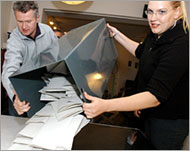Merkel, Schroeder still at odds
German political rivals Angela Merkel and Gerhard Schroeder have failed to agree on who should run the government after inconclusive elections, but vowed more talks to break the deadlock.

With the future of Europe’s largest economy at stake, conservative leader Merkel and incumbent Chancellor Schroeder held exploratory talks on Thursday for the first time since Sunday’s vote, weighing with party allies prospects for sharing power.
They agreed to meet again next Wednesday, but appeared more divided than ever on the question that has been on every German’s mind since Sunday – who will be Germany’s next leader?
Pressing matter
“The personal question has to be cleared up relatively quickly and it has to be accepted by the SPD that Angela Merkel will be chancellor,” said Christian Social Union (CSU) chief Edmund Stoiber, standing beside his ally Merkel after the talks.
A few minutes later Franz Muentefering, head of Schroeder’s Social Democrats (SPD), said: “We focused on issues, but made it clear that we in the SPD want to govern this nation with Gerhard Schroeder as chancellor.”
Merkel, leader of the Christian Democrats (CDU), had been expected to easily defeat Schroeder and sweep into office in a reform-minded coalition with the liberal Free Democrats (FDP).
 |
|
Schroeder has refused to |
But a ferocious late drive by Schroeder to portray Merkel as bent on destroying the country’s cherished welfare state appeared to strike a chord with voters.
They gave her CDU/CSU alliance 35.2% of the vote, the best score among Germany’s top parties but one of the worst performances by the conservatives in post-war history and a result that only narrowly bettered the SPD’s 34.3%.
Grand coalition
Schroeder has refused to concede defeat since then and with Merkel unable to form a majority with the FDP, she has been
forced to enter discussions with the SPD.
The formation of a “grand coalition” between Germany’s two largest parties is now seen by many experts as the best of several less-than-desirable options for Germany.
Other possibilities include a coalition between the CDU/CSU, FDP and environmentalist Greens party, or an alliance between
the SPD, FDP and Greens.
Neither of those two combinations has been tried at the federal level and some fear they would produce unstable governments.
Prospects for a CDU/CSU deal with the SPD have been clouded not only by Schroeder’s insistence he remain chancellor but by
bitter animosity between the two camps, aggravated by Schroeder’s election-night taunting of Merkel on television.
Political inertia
 |
|
The political deadlock could |
Although Merkel had vowed deep reforms of Germany’s economy during the campaign, her party would probably struggle to push through its programme if it ends up governing with the SPD.
The deadlock, which must be resolved before 18 October to avert the prospect of new elections, could hinder European Union decisions on reforms needed to boost the bloc’s economy and re-energise the EU after rejection of a planned constitution.
Prolonged political inertia could also damage Germany’s struggling economy, once the driver of Europe. German growth is now the slowest in the 25-nation EU and unemployment topped the five-million mark this year for the first time in the postwar era.
Ratings agency Standard and Poor’s this week warned that a new government must quickly pursue fiscal consolidation, labour market reforms and an overhaul of the country’s healthcare and pension systems to guarantee the country’s creditworthiness.
Others have warned that deadlock could hit consumption and investment.